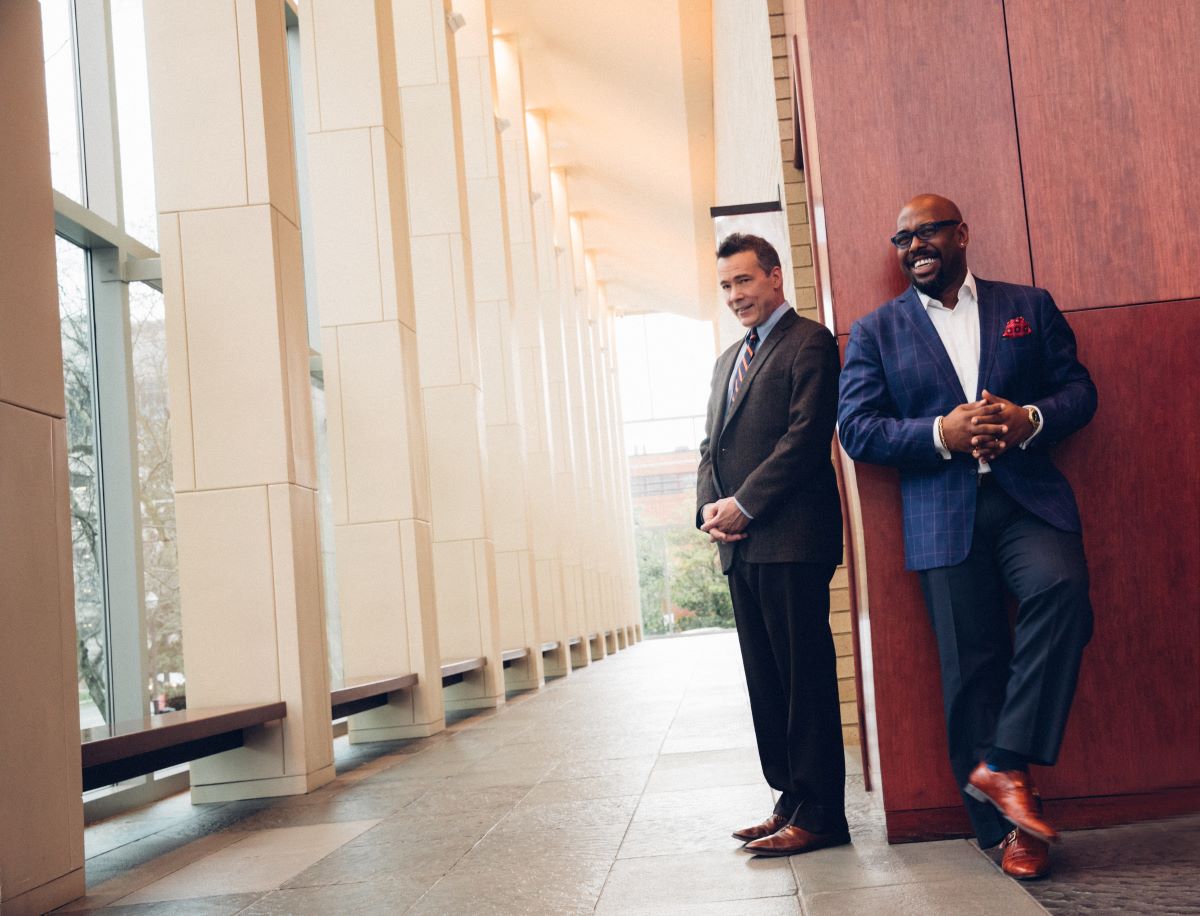But Who’s Gonna Play the Melody?
The bass is traditionally seen as the bedrock of an ensemble, laying a foundation that is, when done right, felt more than noticed. No living bassists have done as much to bring the instrument from the background to the spotlight as Christian McBride and Edgar Meyer. Both belong to an elite cadre of musicians whose jaw-dropping virtuosity on their chosen instruments is matched only by the profound soul and emotion of their playing and the spectrum-wide range of their tastes.
McBride is the premier bassist in modern jazz, a deeply respected player, bandleader, composer and educator who pairs dizzyingly agile soloing with a bottomless groove that makes any band feel great, from funk to swing and beyond. Meyer is a venerated artist in the classical music arena, able to impart stunning emotion to the most beautiful and complex of compositions, while also being a fiery, deep-rooted bluegrass musician. Put the two on the same stage, and there’s hardly a need for any other instrument.
“Christian is the ultimate magic carpet ride,” Meyer says. “He is the easiest human to play music with. From the first note you play, you feel so listened to. You know that he’s got your back. I wish everybody could experience it, but I’m not going to give away my time so anyone else can have it. I want to keep as much of that to myself as I can.”
“As a bass player, it’s such a thrill when you stand next to one of the greatest bass players who ever lived,” says McBride, returning the compliment. “That’s the kind of pressure that encourages you to take extra time in the music gym. I would guess that’s how other basketball players felt going up against M.J. or Kobe.”
That’s high praise indeed coming from either side, but both bassists have garnered their fair share of accolades over the course of their notable careers. The New York Times wrote that McBride “boasts one of the most impressive résumés of any jazz musician in his age bracket,” while Meyer has been hailed by The New Yorker as “the most remarkable virtuoso in the relatively un-chronicled history of his instrument.”
McBride is renowned as both a globally esteemed artist and one of the most respected and influential advocates and educators in jazz. He’s been awarded eight Grammy Awards, garnered acclaim for his poignant ode to the Civil Rights era, The Movement Revisited, and performed at the White House. He leads several acclaimed and diverse ensembles, including the Christian McBride Big Band, the scintillating quintet Inside Straight, and the adventurous New Jawn.
In demand as both a performer and a composer, Meyer has formed a role in the music world unlike any other. He has won five Grammy Awards for his artistry, bridging the realms of bluegrass, classical and folk music in a fashion that appeals to broad audiences and connoisseurs alike. His expansive list of collaborators include many of the most acclaimed figures in contemporary music, including Joshua Bell, Hilary Hahn, Yo-Yo Ma, Jerry Douglas, Béla Fleck, Zakir Hussain, Sam Bush, Stuart Duncan, Chris Thile, Mike Marshall, Mark O’Connor, and Emanuel Ax.
The two perform together for the first time on record with But Who’s Gonna Play the Melody? – released in 2024 through Mack Avenue Records. As playful as the title suggests and as dazzling as listeners would expect from these two modern masters, the album explores the vast variety possible with the pairing of two limitless bassists, encompassing diverse original compositions, American Songbook standards, and familiar classics by jazz and bluegrass masters.
“Edgar and I come from two different places,” McBride explains. “I come from the jazz and R&B worlds with a little bit of classical, and he comes from the bluegrass and classical worlds with a little bit of jazz. With this album we’re meeting each other in unchartered territory. So the first question was, what do we play?”
McBride and Meyer were initially introduced by their mutual mentor, the legendary jazz bassist Ray Brown. It took nearly a decade before they shared a stage together in 2007 under the auspices of Jazz Aspen Snowmass, the Colorado-based non-profit jazz performance and education organization. The pair quickly discovered that the common ground between their disparate backgrounds was a firm foundation in the blues.
“The center of our connection is in things that are earthy and funky and rooted in a blues dimension,” Meyer says. “Then it ranges out from there.”
Hundreds of miles separate Meyer’s hometown of Oak Ridge, Tennessee, and McBride’s in Philadelphia, but their roots feel intertwined throughout But Who’s Gonna Play the Melody? McBride feels as natural dancing the down-home hoedown of Bill Monroe’s “Tennessee Blues” as Meyer does digging into the grit and groove of McBride’s “Philly Slop.” It’s stunning to think that it’s the same musicians flawlessly executing the elegant complexities of Meyer’s “Canon” as it is swinging the 52nd Street jazz feel of McBride’s “Bebop, of Course.”
“Edgar has absolutely perfect execution when he plays the bass – particularly when he plays arco,” extols McBride. “His intonation is perfect; his technique is perfect. But when he plays the blues, I think that kid from Oak Ridge, Tennessee, comes out.”
That deep-seated drawl is in evidence from the outset on “Green Slime,” which opens the album, and “Barnyard Disturbance,” both of which find McBride playing on Meyer’s turf and sounding as nimble on the bass as Béla Fleck has playing the banjo on previous recordings. Meyer also contributed a pair of intricately conversational “Bass Duo” pieces and two “Interludes” on which each takes a turn at the piano to spotlight the other’s individual bass voice.
Meyer also plays accompanist for McBride on a gorgeously wistful rendition of “Bewitched, Bothered and Bewildered,” while McBride takes to the keys for his own tender ballad “Lullaby for a Ladybug,” as Meyer bows the delicate melody with a lighter-than-air grace. Both return to the bass for a fleet-footed spin through Henry Mancini’s nostalgic “Days of Wine and Roses,” and attack Meyer’s arrangement of Miles Davis’ “Solar” at an absolutely blistering pace.
Their shared acquaintance also receives a well-deserved tribute with “FRB 2DB.” The title is a spin on Ray Brown’s “FSR,” which nominally stands for “For Sonny Rollins.” McBride likes to tell the real story, however – that Brown’s tune was written over the changes of Rollins’ classic “Doxy” but with a new melody, thus cutting the sax icon out from any potential royalties and giving a new meaning to the “F” in “FSR.” Meyer’s tune replaces the melody once again, though here the “F” is decidedly meant in loving tribute.
Intimate and raucous, playful and exquisite, gritty and refined – But Who’s Gonna Play the Melody? reveals worlds of influence, experience and inspiration in just two basses. While Meyer is the first to profess that “the bass is a pretty limited instrument,” in his and McBride’s hands it sounds as close to limitless as it ever has.


